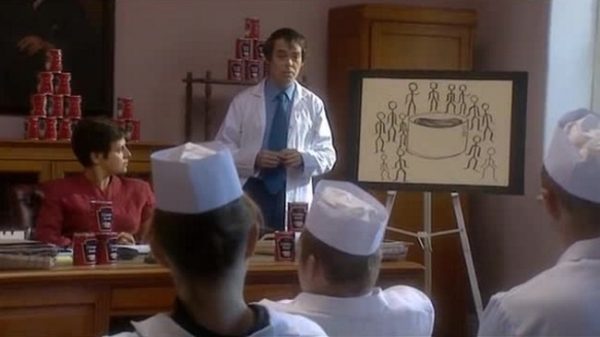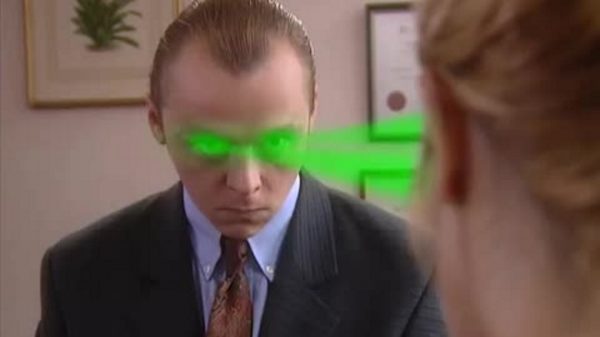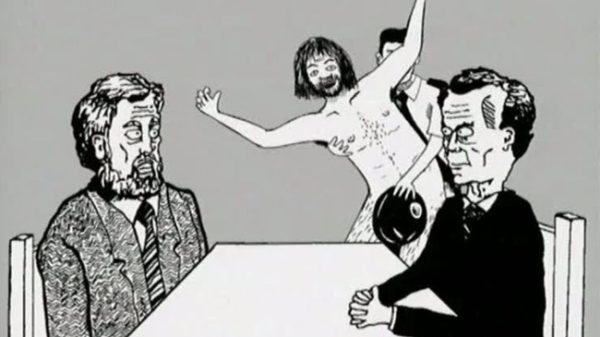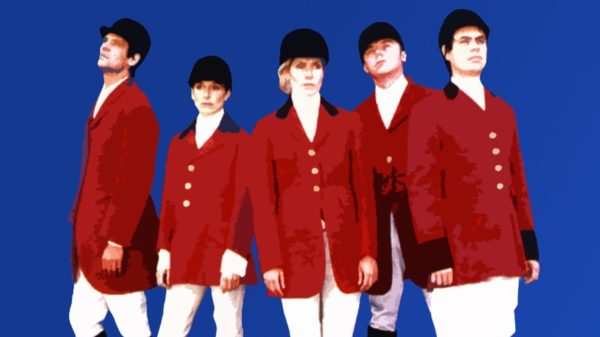It’s now been 20 years since Big Train first aired and while it still maintains a strong cult following, the sketch comedy show never quite receives the level of acclaim it perhaps deserves. It can sometimes get somewhat eclipsed by its more commercially successful contemporaries in the sketch show world. Given the consistency and sheer inventiveness of huge swaths of its content however, it’s not unreasonable to argue that Big Train remains hugely underrated.
Developed by Arthur Matthews and Graham Linehan, the writing team behind Father Ted, Big Train ran for two series between 1998 and 2002. The pair split amicably between the two series with Matthews taking sole control of the second run. The duo’s glorious writing created a wonderfully surreal and inventive show that revelled in subverting expectations and taking you off on unexpected tangents.

Big Train was blessed with an incredibly talented cast, all of whom have since gone on to amass hugely impressive CVs. The most notable Big Train alumni of course is Hollywood’s own Simon Pegg for whom this was his first major TV role, coming a year prior to finding fame in Spaced.
Alongside Pegg were the always excellent Mark Heap and Kevin Eldon, two talented stalwarts of UK comedy shows. In series 1 there was also the excellent Julia Davis and Amelia Bullmore, while series 2 saw Pegg, Eldon and Heap joined by Rebecca Front, Catherine Tate and Tracy-Ann Oberman.
It’s an immensely talented ensemble who also shared an electric chemistry. This can be seen in memorable sketches such as a disgruntled office team being told they are getting a new manager, or indeed where they are being warned about the continual wanking in the workplace. Perhaps even more so than in other sketch comedy shows, this is a series with genuinely impressive performances, thanks in no small part to the entire cast throwing themselves into the insanity with such relish.

It’s the show’s tone which really makes it stand out from the crowd. The writers made a conscious effort to avoid catchphrases and repetitive, predictable characters. Instead they favoured creating an array of unique, silly and wonderfully bizarre scenarios. One of the show’s calling cards was its ability to take a regular everyday situation and give it a quirky and outlandish twist. So we get Jesus and the Devil sharing a tense office workplace relationship, a real life cat and mouse struggling to get on whilst on a night out, a hypnotist doing his very best to help patients despite being “evil” , and Simon Pegg playing a smug man who really struggles to open doors.
Another common occurrence on the show was to reverse the process mentioned above and instead take a far-fetched and bizarre concept and add in an unexpected glimmer of normality. So we get Ming the Merciless unwinding at home and doing some menial tasks, and a re-animated Chairman Mao rising from the dead to sing Roxy Music. There was also a strong line in film pastiches, including a French arthouse spoof in which a woman falls for a set of traffic lights, and a brilliant send-up of Hitchcock’s The Birds in which the feathered creatures were instead replaced with the working class.

In amongst the live action, of course, Big Train also dabbled in a spot of surrealist animation. One of the show’s only real recurring sketches was the brilliant staring contest cartoon which saw titans of the competitive staring world facing off in a huge arena. Featuring the voice of genuine commentating legend Barry Davies, these delirious skits were a perfect spoof of over-enthusiastic TV sports commentary.
It may not have landed every single sketch, but the hit-rate for Big Train was extremely high. It was a show that was unafraid to be experimental and which could also take a turn for the macabre at any moment. You genuinely never knew what to expect next and that unpredictable nature was a crucial part of the show’s appeal. 20 years since it first aired, Big Train remains as inventive, unique and downright hilarious as ever.

